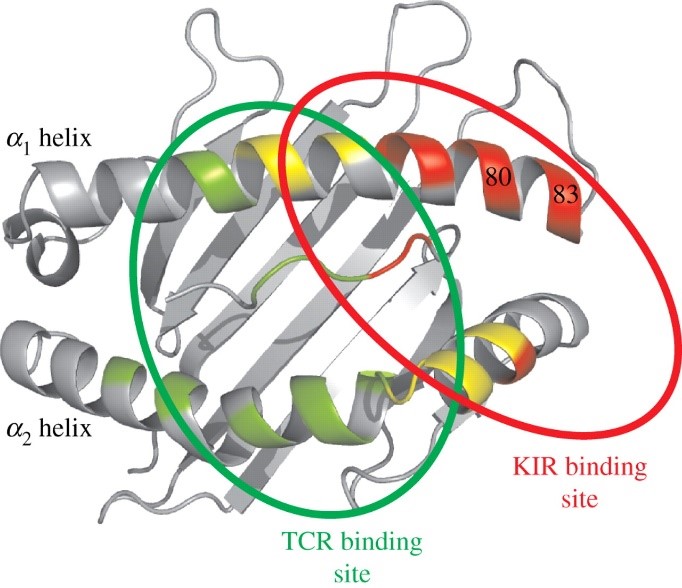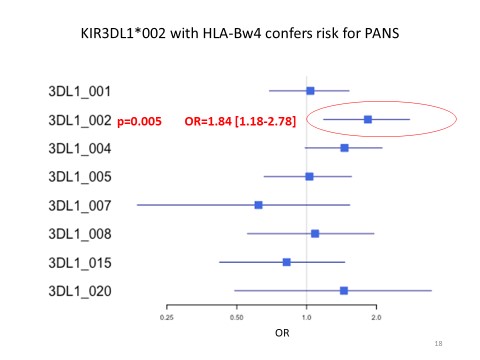Session Information
The 2020 Pediatric Rheumatology Symposium, originally scheduled for April 29 – May 2, was postponed due to COVID-19; therefore, abstracts were not presented as scheduled.
Date: Thursday, April 30, 2020
Title: Poster Session 1
Session Type: ACR Abstract Session
Session Time: 6:00PM-7:00PM
Background/Purpose: Pediatric Acute-onset Neuropsychiatric Syndrome (PANS) is characterized by abrupt onset of obsessive-compulsive disorder (OCD) and/or food restriction with other specified neuropsychiatric symptoms. Patients with PANS have been observed to have co-existing arthritis, immunodeficiency and autoimmune diseases, and/or first degree family members with autoimmune diseases. Our previous study of human leukocyte antigen (HLA) variation in PANS showed significant HLA-B associations including HLA-B38, HLA-B52 and HLA-B27, predominantly B27:02 (Frankovich et al. CARRA Conference 2019). Amino acid level analysis revealed that HLA-B associations could be attributed to variation at positions 80-83 of the molecule, which define the Bw4 serological epitope. Because HLA-Bw4 is the ligand for the inhibitory receptor KIR3DL1 on the surface of natural killer cells (Figure 1), we extended our work to investigate polymorphism of KIR3DL1 in the context of its HLA class I ligands in a cohort of PANS patients and controls.
Methods: Our study sample included 134 unrelated European-ancestry probands from three centers, who met PANS diagnostic criteria (Swedo et al., Pediatr Therapeut 2012), and 1,748 previously sequenced European-ancestry controls (Hollenbach et al., PNAS 2019). We performed next-generation sequencing (NGS) using a novel method and custom bioinformatics (Norman, Hollenbach, et al., AJHG 2016) to determine allelic polymorphism of KIR3DL1 from genomic DNA in patients with PANS and healthy controls, and analyzed the data with respect to its ligand encoded by HLA-A, HLA-B, and HLA-C.
Results: We found that KIR3DL1*002 with HLA-Bw4 was strongly associated with PANS when compared to controls (OR=1.84, 95% CI, 1.18-2.78, p=0.005) (Figure 2). KIR3DL1*002 encodes a KIR inhibitory allotype that is expressed at high levels on the surface of NK cells.
Conclusion: This immunogenetic finding complements our clinical observations in which patients with PANS have a high rate of arthritis (38.8%), other autoimmune diseases like psoriasis, celiac disease, and thyroiditis (17.3%), blood dyscrasias (e.g., leukopenia, lymphopenia) and elevated levels of auto-antibodies (10-20%).(Chan et al. CARRA conference 2019) Concurrent primary immunodeficiency is also common in patients with PANS, with a prevalence rate of 4% (manuscript submitted), and all of these patients had defects in humoral immunity. Siblings and parents of patients with PANS also reported more immune-mediated diseases than healthy controls (adjusted OR 2.80, 95% CI, 1.64-4.76, p< 0.001). This study shows that a specific, high-expression KIR allele, KIR3DL1*002, in combination HLA-Bw4 confers an increased risk in PANS. Together with other immunologic and epidemiologic findings, these immunogenetic findings argue strongly for immune dysregulation as a key contributor to PANS pathophysiology.
To cite this abstract in AMA style:
Frankovich J, Anderson K, Montero-Martin G, Chan A, Thienemann M, Farhadian B, Willett T, Mellins E, Madden A, Murphy T, Swedo S, Fernandez-Vina M, Hollenbach J. The Killer Immunoglobulin-like Receptor KIR3DL1 in Combination with HLA-Bw4 Is Associated with Pediatric Acute-onset Neuropsychiatric Syndrome (PANS) [abstract]. Arthritis Rheumatol. 2020; 72 (suppl 4). https://acrabstracts.org/abstract/the-killer-immunoglobulin-like-receptor-kir3dl1-in-combination-with-hla-bw4-is-associated-with-pediatric-acute-onset-neuropsychiatric-syndrome-pans/. Accessed .« Back to 2020 Pediatric Rheumatology Symposium
ACR Meeting Abstracts - https://acrabstracts.org/abstract/the-killer-immunoglobulin-like-receptor-kir3dl1-in-combination-with-hla-bw4-is-associated-with-pediatric-acute-onset-neuropsychiatric-syndrome-pans/


